Asia-Pacific Member States Commit for Gender Equality
Date:

On 27 September, the Global Leaders’ Meeting on Gender Equality and Women’s Empowerment: A Commitment to Action, co-organized by UN Women and the Chinese Government, resulted in unprecedented political support at the highest level for our agenda. Governments have made concrete national commitments to ensure women and girls can reach their full potential by 2030. Among 80 Member States globally that have stepped it up, 19 are from Asia and the Pacific region. Below are excerpts from the statements of the Asia-Pacific Heads of Government/State.
Afghanistan: Chief Executive, Abdullah Abdullah
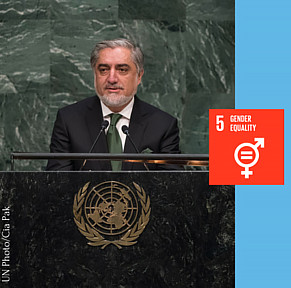
"Protecting the constitutional rights of all our citizens is a high priority for the Afghan Unity Government. As a result, we are conducting comprehensive reforms in our security, legal and judicial institutions, We are sparing no effort to implement Elimination of All forms of Violence against Women (EVAW) law, and our NAP for the Women of Afghanistan (NAPWA). The same is true for our commitments under CEDAW. A lot has been achieved, thanks to the international community. We continue to rely on support from partners. Afghanistan has a vibrant civil society and women were the most active. … Afghanistan will do its part to reach the goal for 2030." [Speech]
Australia: Natasha Stott Despoja AM, Australia’s Ambassador for Women and Girls
"Australia makes new commitments internationally and at home to empower women and girls". In this anniversary year [of the Beijing Declaration and Platform for Action] and to progress the 2030 Agenda, Australia is making new commitments both internationally and at home to empower women and girls. Australia’s Minister for Foreign Affairs has launched a new Gender Equality Fund. This Fund will accelerate support for gender equality in our overseas development program with a focus on women’s economic and leadership participation and addressing violence against women. Australia will confront record levels of homicide of women, and domestic and family violence, committing new funds for frontline services, support for women from culturally and linguistically diverse backgrounds who are experiencing violence, and primary prevention initiatives to change the attitudes of young people towards violence against women and their children. To increase women’s workforce participation, responding to G20 commitments of 2014, Australia is providing new financial literacy projects for women, improved assistance for child care and small business reforms that will deliver new opportunities for women in the workforce. [Commitment statement]
Bangladesh: Prime Minister, Sheikh Hasina
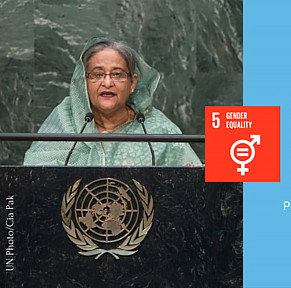
"The sustainable development [agenda can bring] positive change in the lives of our women and girls. We should seize this opportunity. In this context, it is our commitment to continue to work towards the social, economic, and political empowerment of our women, and give our girls higher education. We shall create more opportunities and access for our women to participate in politics, business and government. We shall continue to work for ending all forms of discrimination and violence against women. We shall create a safer environment for our women and girls to thrive as agents of change. My government has plans to eliminate child marriage by 2041. We shall continue to give attention to maternal health and nutrition."
Bhutan: Prime Minister, Lyonchhen Tshering Tobgay
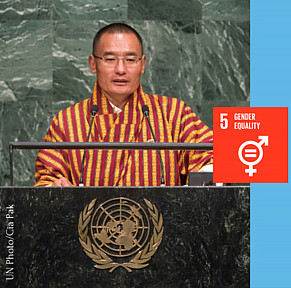
“I pledge my Government’s full commitment to the accelerated implementation of the Beijing Declaration and Platform for Action and to the realization of the gender equality goals of empowerment in the 2030 Agenda. More specifically, I recommit to support ongoing initiatives to increase representation of women in governance and decision-making at all levels. For this, we have commenced extensive nation-wide consultations to explore measures to encourage women’s participation in politics. We commit to strengthen targeted programmes for economic empowerment of women. This is critical to address the persistent burden of poverty on women and effectively remove inequality and economic structures and policies. We commit to enhance investment in programmes that ensure equal access to the critical areas of education and training and healthcare for women. We commit to render full support to agencies and civil society organizations that combat violence against women and girls and we commit to promote programmes and policies that strengthen the role of women in the management of natural resources and in the safeguarding of our environment.”
Brunei Darussalam: Sultan and Yang Di-Pertuan, Haji Hassandal Bolklah
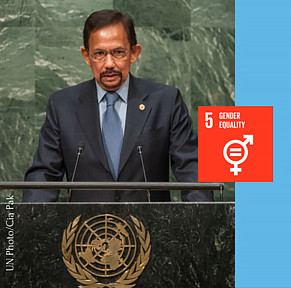
"In Brunei, our experience on this issue is based upon our long-standing policy to provide universal access to education. In the 1950s ... education was made free to all children irrespective of gender. … Our girls and women have equal opportunities to upgrade their knowledge and skills particularly in evolving areas like ICT. … Our women have attained employment in various professional fields like medicine, law, business and engineering. …They have equal access to healthcare facilities, free for all citizens. Over the past two decades, our women's life expectancy has improved to about 80 years. They're increasingly active in business ventures through various credit financing schemes. …We are also making efforts to protect women's rights through legislation and plans of action, which we will continue to review when necessary. Regionally, we're part of the commission on promoting and protecting the rights of women and children. … Our continued effort to fulfill our international responsibilities are shown by our commitment to the [Millennium Development Goals] and [Sustainable Development Goals] as well as Convention on Eliminating all Forms of Discrimination against Women. … I'm pleased to reaffirm our commitment towards implementing the objectives of the Beijing Declaration and Platform for Action."
Cambodia: Prime Minister, Hun Sen
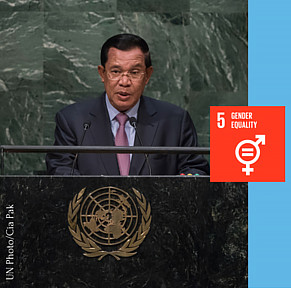
“Cambodia has achieved remarkable progress in major areas, [such as]: Adopting laws and regulatory frameworks to protect, eliminate discrimination, and reduce violence against women and girls; promoting gender equality in education through increasing [the] enrolment rate of girls in both primary and secondary levels; promoting women’s involvement in [the] economy and enhancing their access to financial services, so as to strengthen their financial autonomy; improving the health status of women and children, particularly through achieving the MDG target on maternal mortality; and promoting the engagement of women in political affairs and decision-making at all national institutions and levels, including legislative and executive branches, and all the institutions in both national and sub-national levels." "We should give priority to the following works: Increasing investment in gender equality, especially by reviewing fiscal policies to generate and increase public spending on gender equality, including monitoring and analyzing the impacts of such public spending on gender inequality through gender-responsive budgeting. Two: Ensuring the protection of women’s rights, as well as full and equal participation of women in decision-making at all levels. Three: Strengthening accountability mechanisms for gender equality by strengthening government institutions with effective means of monitoring progress and ensuring sufficient provision of resources for gender works. And continuing to promote women’s involvement in the economy and their financial inclusion.” [Speech]
China: President, Xi Jinping
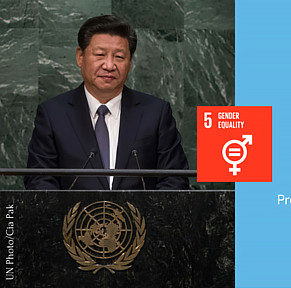
“China will do more to enhance gender equality as its basic State policy, give play to women's important role as ‘half of the sky’ and support them in realizing their own dreams and aspirations in both career and life. … Let us reaffirm the support of the Beijing Conference with renewed commitment and pledge greater efforts to promote gender equality and women’s all-around development. … To support women’s development worldwide and the work of the UN Women, China will donate USD 10 million to UN Women for the implementation of the Beijing Declaration and Platform for Action and the realization of the related goals in the post-2015 development agenda. In the coming five years, China will help other developing countries build 100 ‘health projects for women and children,’ send teams of medical experts to provide services and implement 100 ‘happy campus projects’ to finance the schooling of poor girls and raise girls’ school enrolment rate. We will also host 30,000 women from developing countries for training programmes in China and provide 100,000 skills training opportunities in local communities of other developing countries. Under the related fund co-sponsored by China and the UN, there will be special capacity-building programmes for women from developing countries.” [Speech]
Fiji: Prime Minister, Josaia Voreqe Bainimarama
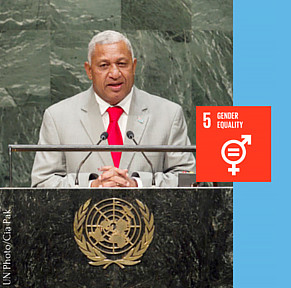
"In the Pacific region, Fiji boasts a gender-responsive and socially inclusive Constitution. For the first time, Fiji has a female speaker of Parliament and…four women possess significant ministerial portfolios. Over the last seven years, the Government has increased funding to the national women’s machinery by some 320 per cent. [We] will continue…, with adequate funding and human resources, to strengthen…[gender-disaggregated data] to better influence policies…. We have amended our criminal laws to make [them] modern and gender inclusive… Our family laws have also been amended [to] recognize the rights of women in de facto relationships, and to provide legal protection in terms of spousal maintenance and property rights. My government also introduced …[a] domestic violence law [that] allows any person to apply for [a] domestic violence restraining order. The police are legally obligated to enforce the safety and well-being of…women and children facing domestic violence."
Indonesia: Vice President, Jusuf Kalla
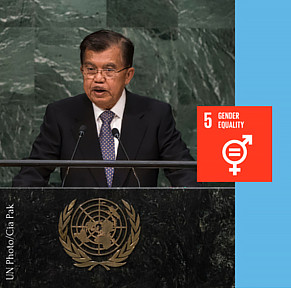
"We are more than eager to improve the quality of life of women. We must ensure that women have equal and inclusive access to greater participation in as well as better control of and benefit from all sectors. Toward this goal, Indonesia is focusing on three key areas. First, increasing the participation and representation of women in decision-making...by promoting women in leadership positions. Second, reducing maternal mortality rates by expanding access to reproductive health services. And third, eliminating all forms of violence against women and girls by informing all stakeholders in the family and community including the men [about combatting] this heinous crime.... We believe a stronger commitment, improved means of implementation and better cooperation are key to overcome current and future challenges. Indonesia for its part is pleased to join in partnerships and pledges...to realize our national priorities and common [goals] for gender equality and women’s empowerment." [Speech]
Japan: Prime Minister, Shinzō Abe
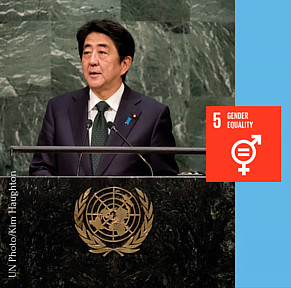
“Since I became Prime Minister of Japan, the fundamental pillar of my policy has been the realization of a society where women shine. As a result in the past three years more than 90,000 women have entered the Japanese labour market. We have set a goal that about 30 per cent of leadership positions…be occupied by women by 2020…already, the percentage of women among newly hired national public servants in Japan has exceeded 30 per cent. …Last month, Japan enacted a new law to promote the active engagement of women in society [so that it will become] commonplace for both men and women to share responsibility for work, household chores and child rearing. …Japan’s donation [to UN Women] has increased tenfold in the past two years… [and] a new UN Women liaison office was recently opened in Japan…. Japan has pledged to contribute more than 42 billion yen… in the next three years. Japan will continue to implement further actions and initiatives toward resolving challenges for gender equality, development and peace…” [Speech]
Lao People's Democratic Republic: Deputy Prime Minister, Thongloun Sisoulith
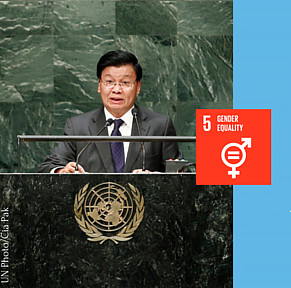
“The Government has established a national institution…to promote gender equality and women's advancement.... Gender equality has been enhanced, (including in) education and health…. The maternal mortality rate has declined. The Government has endorsed the National Plan of Action on violence against women and…children, [and the] National Assembly has endorsed a law on…prevention. Women's roles in all fields have been widely strengthened. For example, women account for 25 percent [of the current…National Assembly]. The Government will continue to implement its gender equality policy through...2030, the 10-year social-economic development strategy and the five-year social economic development plan.” [Speech]
Malaysia: Prime Minister, Najib Razak
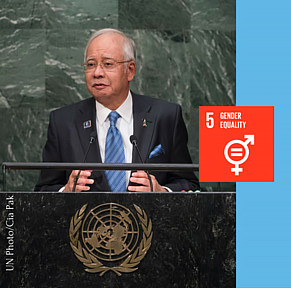
“Malaysia has always stood by the Beijing Declaration and Platform for Action… Malaysia has a long tradition of empowering women. … In Malaysia, we aim to achieve high-income nation status by 2020. But we cannot do this without women being equal partners, and we need them to be drivers of growth – growth that will bring prosperity to all our citizens. … In our last budget, we made upholding the role of women one of our main strategies. ... We set a target of increasing the female labour participation rate from 54 per cent as of last year to 59 per cent by 2020. And next year, all Malaysian public companies must disclose their level of gender diversity in their annual reports. … As we are aware that single mothers and female-headed households are often socially and economically disadvantaged, particularly in rural areas, my Government is going to launch a national action plan to empower single mothers next month.”
The Federated States of Micronesia: President, Peter Christian
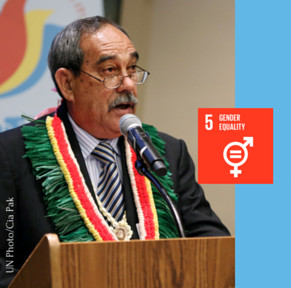
“I propose that we reach our goal before its time. Micronesia has adopted a strategic development plan that was started in 2004 and will end in 2023. That plan includes the participation of women in all areas. The Government of Micronesia will pursue with more vigor the unfinished work of the MDGs, while focusing on Sustainable Development Goal 5 and its cross-cutting [effect].” [Speech]
Nepal: Deputy Prime Minister, Prakash Man Singh
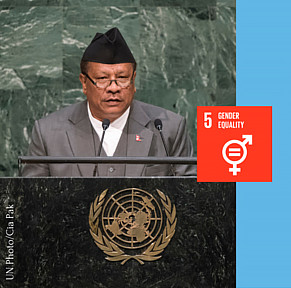
"Over the years, Nepal has made substantive efforts of further promotion of gender equality and empowerment of women. … The following actions are the highlights of our commitments and achievements in this field: Adoption and implementation of proportionate, inclusive and affirmative policies, laws; mandatory participation of women in all civil and security agencies; implementation of action plans, including CEDAW and the Beijing Declaration and the Platform for Action; implementation of national action plans based on the UN Security Council resolutions 1325 and 1820; enactment and enforcement of laws and rules with the government’s zero-tolerance policy tool on sexual and domestic violence, workplace-related sexual harassment, child marriage, witchcraft allegations, and other gender-based discriminations. [We have elevated] the national women’s commission to constitutional status; [mainstreamed] gender as a cross-cutting issue in all development policies and programmes, including through a gender-responsive budgeting system, which has now reached 22 per cent of the total budget. [We are] integrating … legal rights and instruments –including ICCPR, CEDAW, CRC, CRPD– into national legislation. Nepal has an inclusive and democratic Constitution written by the elected representatives of the people which was just promulgated last week on 20 September. While women enjoy all the fundamental rights and freedoms that are enshrined in the new Constitution, art. 43 specifically deals with the rights of women that include the right to lineage, right to safe maternity and reproduction, right against all forms of exploitation, equal rights in family matters and property. The Constitution ensures at least 33 per cent representation of women in Parliament. Most importantly, the new Constitution has a provision [for] persons of the same gender…"
Pakistan: Prime Minister, Muhammad Nawaz Sharif
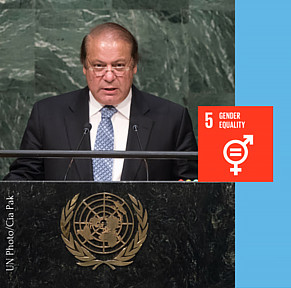
"We welcome the inclusion of a stand-alone goal on gender equality and women’s empowerment in the post-2015 development agenda. The challenge now is to invest sufficient resources and to adopt appropriate policies to ensure its full and effective realization. … We have introduced many initiatives over the years, including the…establishment of national and provincial commissions of the status of women. Led by women, they are independent and contributing to formulation of legislation and policies for women’s empowerment and gender equality. [We have] strengthened and improved the implementation of the national policy for development and empowerment of women…and [enacted and implemented] pro-women legislation including the criminal law amendment act and women in distress in detention act…. [W]omen’s empowerment is the first pillar of our key planning document, Vision 2025. All countries stand to benefit from the empowerment of women. We are therefore determined to ensure a more central role for women in the political, economic as well as other spheres of national life."
Samoa: Prime Minister, Tuilaepa Sailele Malielegaoi
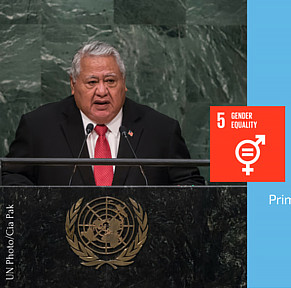
"In Samoa, we are…acutely aware that we must make every effort to develop and release the full potential of our women. We have already made important strides in…education as well as employment opportunities. Many…ministries are led by women…. Still, much remains to be done. Samoa is committed to mainstreaming policy on gender equality and the empowerment of our women across all sectors of government…. Given that climate change affects men and women differently, we have now integrated fully the needs of women and girls into our national climate resilience, disaster prevention and response policies and operations. ...In May 2015, salaries for village women representatives were raised to address [a] gender pay gap…. The Constitutional Amendment Act of 2013, which guarantees a minimum of 10 per cent of seats for women in our national parliament…will make women representatives…an integral and permanent feature…. Samoa is committed to [advancing] the full and effective implementation of the Beijing Declaration and Platform for Action within the next development agenda." [Speech]
Sri Lanka: President, Maithripala Sirisena
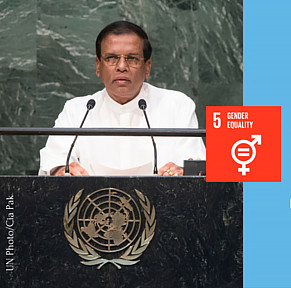
"Free education for both boys and girls, and free healthcare were introduced very early after independence. …Since the adoption of the Beijing Platform for Action, further steps were taken to achieve gender equality. This was mainly by introducing reforms to domestic laws and mainstreaming gender-related priorities into government action plans.… [A] National Action Plan on women…is currently being updated…. We also have [a] dedicated Ministry on women’s matters. My Government and I take the responsibility of ensuring [the] promotion and protection of the rights of women in my country very seriously and we remain firm in our commitment to strive continuously with diligence to achieve gender equality and women’s empowerment." [Speech]
Thailand: Prime Minister, Prayut Chan-o-cha
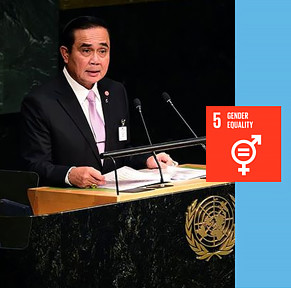
"Recently, Thailand promulgated the 2015 Gender Equality Act, which became effective on 9 September 2015, so we can protect all individuals from gender-based discrimination. Thailand is resolved to move forward on gender equality in the following areas: First, by developing a curriculum on gender roles to cultivate positive attitudes and an acceptance of gender equality in children from an early age. Second, by collecting sex disaggregated data, for analytical purposes and for formulating gender-sensitive policies as well as for monitoring progress made in the realization of gender equality. Third, by providing training to relevant public agencies at the national level in order to promote gender-responsive budgeting. Thailand’s next national and economic and social development plan will also focus on people-centred, inclusive development, and also on reducing social inequality. This will provide further opportunities for women to participate even more equally in our national development." [Speech]
Timor-Leste: Prime Minister, Rui Maria Araujo
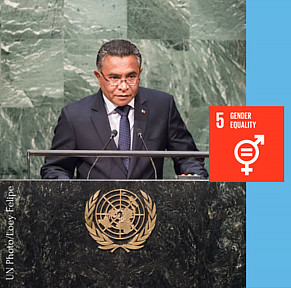
“The Timor-Leste Constitution…provides that men and women must be treated equally in all aspects of life.… Our Government…prioritized action to end the discrimination of women and girls…and to stop gender-based violence. Timor-Leste fully supports [Sustainable Development Goal 5], which seeks to achieve gender equality and empower all women and girls. We also recommit to implement the Beijing Platform for Action as we celebrate 20 years since its adoption. Our country has a proud history of support for women. During our fight for independence, women participated actively in all fronts of the struggle. And now Timor-Leste has one of the biggest proportions of women parliamentarians in the world and the highest in the Asia-Pacific region. In our last elections, 38 per cent of those elected to the national parliament were women. …We must improve the situation of women and address the pervasive gender discrimination if we are to meet our development goals. …We fully commit to achieving gender equality and empowering women and girls.”
Viet Nam: President, Truong Tan Sang
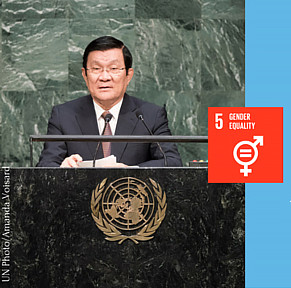
"Gender equality is not merely a goal but rather the common thread of the 2030 Agenda for Sustainable Development. Viet Nam pledges to devote all resources needed to bridge the gender gap in all domains. Viet Nam will continue to step up awareness-raising campaigns on gender equality, and work hard to ensure that 100 per cent of its radio and television stations broadcast exclusive gender equality programmes…. The HeforShe movement has found strong resonance in Viet Nam. Viet Nam pledges to further improve the access of women, especially those in difficult areas, to health care, education and employment services. Viet Nam sets a target that by 2020, 50 per cent of its rural women will have access to various forms of vocational training, and 95 per cent of women aged 15-40 living in remote areas [will be] literate. The country is also committed to sparing no efforts to gradually eradicate all forms of violence against women and girls, and has set a target that at least 50 per cent of all the reported victims of domestic violence [are] provided with health care and counselling services."